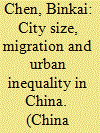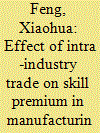| Srl | Item |
| 1 |
ID:
187885


|
|
|
|
|
| Summary/Abstract |
China has witnessed rapid increases in the skill premium over the last few decades. In this paper, we study the short-run effect of capital goods imports on skill premium in China. The surge in capital goods imports, which embody advanced technology, can explain the rising demand for skill in China. We exploit regional variations in capital goods import exposure stemming from initial differences in import structure and instrument for the capital goods import growth using exchange rate movements. A city at the 75th percentile of the distribution of capital goods imports growth has a higher skill premium by 5 percentage points (0.38 standard deviation) over the one at the 25th percentile. To explore the underlying mechanism, we provide firm-level evidence and show that imported capital goods are skill-complementary.
|
|
|
|
|
|
|
|
|
|
|
|
|
|
|
|
| 2 |
ID:
161870


|
|
|
|
|
| Summary/Abstract |
This paper examines the relationship between city size, migration, and urban income inequality using a subsample of the 1% population census of China in 2005. We calculate various measures of within-city income inequality for 252 Chinese cities. It is found that overall city income inequality is significantly and positively correlated with population size. As migration is crucial in determining city size distribution in China, we focus on exploring the role of massive migration into big cities in shaping this size-inequality relationship. We find that the share of migrants alone accounts for more than 40% of the city size inequality premium. This is primarily because migration leads to higher skill premiums in larger cities by changing the skill composition of workers in those places.
|
|
|
|
|
|
|
|
|
|
|
|
|
|
|
|
| 3 |
ID:
152514


|
|
|
|
|
| Summary/Abstract |
This study analyzes the transmission mechanism for the increase in the skill premium caused by international outsourcing through skill-biased technological change (SBTC). Using 2000–2013 panel data from 27 manufacturing industries in China, this study conducts both probit and Tobit tests and shows that international outsourcing led to SBTC in China's manufacturing industries. A positive correlation is found between international outsourcing and the increase in the skill premium in both static and dynamic models. For each 1-percent increase in the international outsourcing index, the skill premium will rise approximately 10 percent. This finding indicates the existence of a mechanism through which the effect of international outsourcing on the skill premium is reinforced where SBTC is occurring. However, this may enlarge wage gaps within the same industry. Therefore, China should not only use the skill premium to promote the transformation and upgrading of industries benefiting from outsourcing and optimize the structure of employment but also prevent the negative effects of an increased skill premium.
|
|
|
|
|
|
|
|
|
|
|
|
|
|
|
|
| 4 |
ID:
161777


|
|
|
|
|
| Summary/Abstract |
In making use of the panel data in 27 manufacturing industries, this paper examines the recent increase in skill premium in China's manufacturing. The paper argues that the recent increase in skill premium in Chinese manufacturing can be partly attributed to the decline in intra-industry trade. A reasonable explanation on this is that the decline in intra-industry trade occurred in the period studied is associated with a decrease in output. This led to a reduction in relative demand of low-skilled workers, which supports the hypothesis of the output-skill substitutability, and finally an increase in skill premium. Further, this paper finds that the negative effect of intra-industry trade on skill premium is larger for high-skilled manufacturing than low-skilled manufacturing. One more result in this paper is that the increase in capital input reduced the skill premium in Chinese manufacturing. The empirical evidence is consistent with a modified model of intra-industry trade with differentiated products and three factor inputs: high-skilled labor, low-skilled labor and capital.
|
|
|
|
|
|
|
|
|
|
|
|
|
|
|
|
| 5 |
ID:
092428


|
|
|
|
|
| Publication |
2009.
|
| Summary/Abstract |
Using 1987-2006 panel data for China, we explore the dynamics of the skill premium. The present paper focuses on the skill premium as an explanation for why income differences are so large in China. Our empirics show that: the rise in the relative supply of skilled labor results in an increase, instead of a decrease, in the skill premium; domestic investment is not complementary with skill formation; the skillpremium is higher in more developed provinces; economic openness facilitates an increase in the skill premium; whether foreign direct investment induces skill-based technology change or not, it drives up the skillpremium. An array of policy prescriptions for reducing income differences and ensuring sustained economic growth are provided.
|
|
|
|
|
|
|
|
|
|
|
|
|
|
|
|